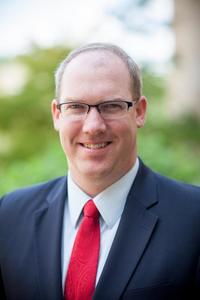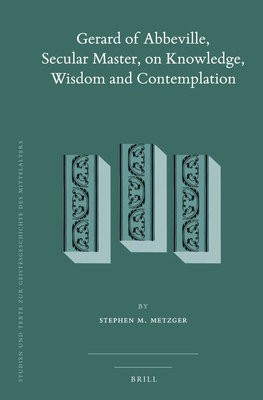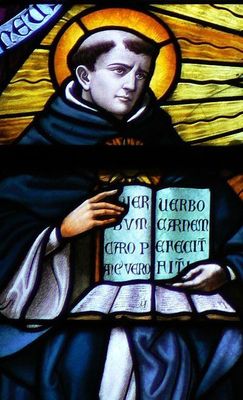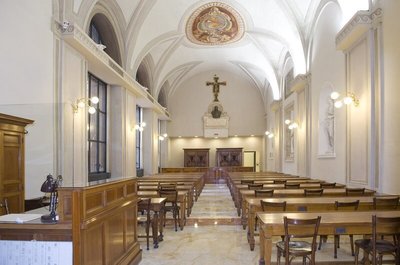Alumni Spotlight: Stephen Metzger

The Medieval Institute is pleased to present our spring 2020 Alumni Spotlight. In this series we feature the career paths of Institute alumni. Look for a new installment each semester, and follow our weekly news features regarding Medieval Institute-supported programming, events, guest lectures and general medievalist news on our news and events feed.
This semester, we're highlighting the career and insights of Stephen M. Metzger, who was recently appointed to the position of Scriptor of Latin Manuscripts at the Biblioteca Apostolica Vaticana. Metzger studied Scholastic Philosophy at the MI and earned his Ph.D. in 2013 with a dissertation entitled “Gerard of Abbeville, Secular Master, on Wisdom, Knowledge, and Contemplation” under the direction of Professor Kent Emery, Jr.
Following his graduation, Dr. Metzger was a 2014–2015 Mellon Fellow at the Pontifical Institute of Mediaeval Studies, University of Toronto, and the 2016–2017 Astrik L. Gabriel Fellow at the Medieval Institute. In 2017, Dr. Metzger published a two-volume study entitled Gerard of Abbeville, Secular Master, on Knowledge, Wisdom and Contemplation in the series Studien und Text zur Geistesgeschichte des Mittelalters (Leiden: Brill, 2017).
We spoke with Dr. Metzger and asked him to share about his journey from MI graduate student to his new position as Scriptor and to offer some reflections on his experiences to our current graduate students.
What initially sparked your interest in Medieval Studies?
My interest in the study of the Middle Ages was sparked by inspiration and curiosity. My main inspiration was my father, who had been a graduate student in medieval Latin and history under Bengt Löftstedt at UCLA during the 1960s and 1970s. He also spent two years in Munich attending Bernhard Bischoff’s seminar. Sadly, he did not finish his degree; I knew him primarily as a high school math teacher. He was truly a Socratic master, drawing out the best of his students by his questions and observations so that they would be in control of their own education.

It was the same way at home. He was a consummate teacher, never imperiously dictating the one way to find a solution nor providing the easy answer. Around the dinner table and in conversations during road trips, I came to know only fragments of his story and the depth of his knowledge. It was up to me to choose my own path.
Our home was covered in an impressive collection of books, most of which were written in languages that I did not know on topics that I did not understand. He was one of the smartest people I have ever met, and as I grew older, I began to realize that he could provide a cogent answer to my questions, especially those that concerned history and religion.
This fostered my curiosity in the Middle Ages, and by his stories and reminiscences, he introduced me to the world that he had known as a grad student, especially during those two years in Munich. This inspired me to pursue a similar path. I have a love for the study of languages and European history more generally, and under his guidance, I grew more and more fascinated by the Middle Ages.
I eventually developed an interest in intellectual history, especially during the scholastic period. This was encouraged by one of my teachers in high school, Robert Scholla, SJ, who taught a senior elective in which we read Augustine, Anselm, Bonaventure, and Thomas Aquinas.
By the end of high school, I knew that I wanted to study the Middle Ages, especially this aspect. It was at this point that my dad stepped in and advised me to make sure that I had the languages first. I took an undergraduate degree in Latin, Greek, and philosophy, although I must admit that I read more modern philosophy in college than ancient or medieval.
I am most excited about the work that I will get to do in the Biblioteca Apostolica Vaticana. It is still hard for me to fathom that I am going to have access to one of the greatest collections of Latin manuscripts in the world. [...] I cannot think of a better position from which to make a real contribution to the advancement of scholarly knowledge about the Middle Ages.
What attracted you to the Medieval Institute as opposed to a traditional discipline-specific program?
I was attracted by the interdisciplinary nature of the program. I was in many ways an outsider to medieval studies, even though I was convinced that I wanted to study the Middle Ages. For example, my undergraduate senior thesis was a comparison of Carl Orff’s orchestral score to the texts of the Carmina Burana. I had studied classics and (modern) philosophy in college. This had fostered an interest in a variety of topics and areas. As a result, I couldn’t say with certainty in what field I was interested in pursuing a Ph.D. because it all appealed to me. I liked the fact that at Notre Dame I would need to take courses in several different areas, which, to my mind, would allow me to narrow my focus gradually.
What will your responsibilities as Scriptor of the BAV be, and how did your training at Notre Dame prepare you for this position?
My role is to continue the cataloguing of the Latin manuscripts in the Vatican’s collection. I would say that my role is that of a researcher. I have no doubt that in the process of composing a catalogue, I will make a number of interesting, and perhaps unexpected, discoveries.

The systematic, scientific cataloguing of the library’s collection is a monumental task that has been undertaken for a little over a hundred years. My training in the study and description of manuscripts is essential for this role. If it were not for my teachers in the MI, especially Daniel Sheerin, F.A.C. Mantello, Calvin Bower, and above all, Kent Emery, Jr., I would not be prepared to take on such responsibility.
I would also say that the interdisciplinary nature of my education is a great asset for my role. There can be no doubt that I will encounter texts that are outside of my specific area of expertise, and my broad training will doubtless come in handy.
Finally, my formal education was augmented by the many years that I worked for the Bulletin de philosophie médiévale. In the course of verifying thousands of references and correcting footnotes, I learned the Paleography Room of the Medieval Institute’s Library like the back of my hand. I was introduced in a deep way to the bibliography of manuscripts, codicology, paleography, philosophy, theology, and even law. All of this together will be indispensable for my work.
What are your thoughts on living and working in Rome, and what are you most looking forward to about being there?
I'm looking forward to it. I know that there will be a great number of challenges, many of which I haven’t thought about and cannot predict. I am excited to live in one of the great cultural cities in the world, and the native Southern Californian in me is happy to be back in a Mediterranean climate.
I hope, and I believe, that living and working in Rome will be tremendous. I am looking forward to being in Europe and close to so many friends and colleagues that I have across the continent. I am also looking forward to greeting and hosting so many friends that I know at some time or another will come through Rome.
I was asked in my interview if this was a dream job. I answered ‘no’ because at no point in my wildest dreams did I ever think such a position would be possible for me. Not only is it overwhelming in terms of the materials that I will have access to but also in terms of those in whose footsteps I will be walking, especially Franz Cardinal Ehrle, who as Prefect of the Library, began the project to scientifically describe the manuscript collection, and Auguste Pelzer, a well-known Scriptor of the first half of the twentieth century, to name just two.
What advice would you have for current graduate students thinking about alt-ac and especially library-related career paths?
My best advice is to pursue what most interests you. I may not have known precisely what I was going to study when I entered graduate school, but I knew that it would be something along the lines of philosophy, theology, and Latin. My uncertainty is, unfortunately, not a luxury that many graduate students can afford anymore. The pressure to finish is intense, and one must hit the ground running. But accomplishing that feat will be easier if the student pursues something about which he or she is passionate.

The pressure to compare oneself to one’s peers and teachers can be intense and overwhelming, to say nothing of the rigors of finishing a dissertation. It is easier to bear when studying a subject that one finds particularly exciting.
I know that might sound trite. I also benefited from a certain perspective. Because of my dad’s experience in the 1970s and some good advice that I was given in college, I was well-aware when I arrived at Notre Dame that my time in graduate school could be the extent of my academic career. I was content with this, and for that reason, I was content with the ebbs and flows of my life since I finished.
I am not sure that anyone knows anymore what the straight and narrow path to a coveted tenure-track teaching and research job is. The key to me would be to find some path that allows a person to continue to use the skills and knowledge developed in graduate school, even if that means on the side. When I was working at a brewery or teaching high school, I did not think of myself as no longer an academic.
I would also say that for me a library career is not really an alternative to academia. Even though I will not be teaching on a regular basis, which I will miss in many ways, I cannot think of a better position from which to make a real contribution to the advancement of scholarly knowledge about the Middle Ages.